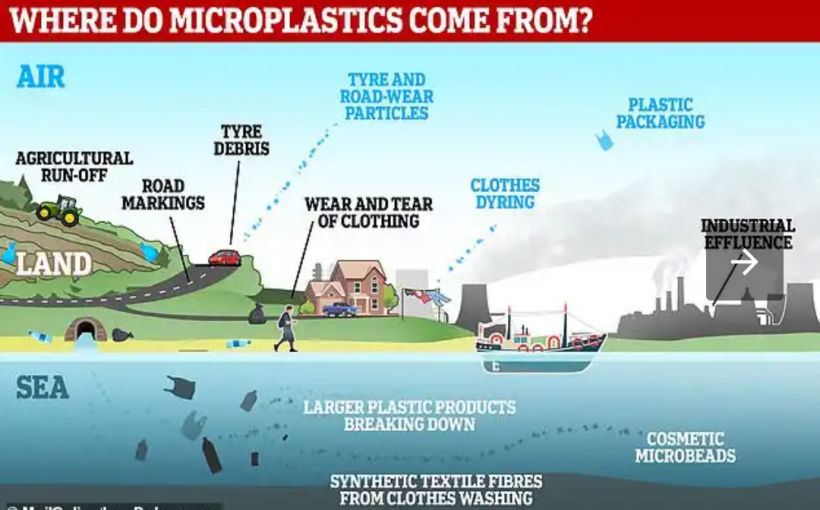We are all eating around 73,000 tiny bits of plastic every year through our food and drink, according to a new study. These are inadvertently entering our mouths, guts and faeces as scientists discover that an average daily motion contains 200 pieces of microplastics. Researchers found that bottled water may be one of the biggest sources of the microparticles – which may endanger health.
Microplastics are also abundant in marine life that eat rubbish dumped in the sea before making their way onto our plates. On average they found 20 pieces of microplasic per ten grams of human stool. Plastics were found in every human stool sample taken from participants across the world – including the UK. Lead researcher Dr Philipp Schwabl, of the Medical University of Vienna in Austria, said: ‘This is the first study of its kind. ‘It confirms what we have long suspected, that plastics ultimately reach the human gut.’
Microplastics include broken-down plastic waste, synthetic fibres and beads found in personal hygiene products. The risk to people is still not known but there are concerns they can accumulate toxic chemicals and the tiniest could enter the bloodstream. Dr Schwabl said: ‘Of particular concern is what this means to us, and especially patients with gastrointestinal diseases.
‘While the highest plastic concentrations in animal studies have been found in the gut, the smallest microplastic particles are capable of entering the blood stream, lymphatic system and may even reach the liver. ‘Now that we have first evidence for microplastics inside humans, we need further research to understand what this means for human health.’ The faeces of all eight volunteers – who also came from Finland, Italy, Japan, the Netherlands, Poland, Russia and Austria – had hundreds of pieces of plastic.
The most common were polypropylene and polyethylene-terephthalate (PET) – both found in food and drink packaging. Dr Schwabl said: ‘All eight stool samples tested positive with an average of 20 microplastics per 10 g of human stool.’ The daily stool excretion of an average adult is about 100g – meaning there will be 200 bits of plastic. Over the course of a year this will equate to around 73,000. Dr Schwabl said: ‘Polyethylene [used to make plastic bags] and polyethylene terephthalate [PET plastic bottles] accounted for the largest share of plastics found in human stool.’ His team also detected seven other forms of plastic types – suggesting there are many different sources of ingestion.
It’s estimated the annual intake of microplastics per person from shellfish, tap water and salt is up to 11,000, 5,800 and 1,000 respectively. This is on top of around 70,000 being breathed in through polluted air by some people. The particles are present in dust. Dr Schwabl said the average intake is higher among bottled water drinkers. He said: ‘Bottled water may also be a strong contributor to microplastic ingestion, with an average of 118 to 325 particles per litre, for a total of 90,000 microplastics annually if the intake comes entirely from these sources.’
Microplastics are less than 5mm in width and are used in various products for specific purposes. They are also created unintentionally by the breaking down of larger pieces of plastic through weathering, degradation, wear and tear. Dr Schwabl said microplastics could damage the gastrointestinal tract. He said: ‘It could affect the tolerance and immune response of the gut by bioaccumulation or aiding transmission of toxic chemicals and pathogens.’ In the study, published in the journal Annals of Internal Medicine, each person kept a food diary in the week leading up to their stool sampling.
The diaries showed that all participants were exposed to plastics by consuming plastic wrapped foods or drinking from plastic bottles. None of the participants were vegetarians and six of them consumed sea fish. The stools were tested at the Environment Agency Austria for ten types of plastics following a newly developed analytical procedure. Global plastics production has increased substantially from the 1950s and continues to grow every year.
Up to five per cent of all plastics produced end up in the seas. Once in the ocean, plastics are consumed by sea animals and enter the food chain where ultimately, they are likely to be consumed by humans. Significant amounts of microplastic have been detected in tuna, lobster and shrimp. Beyond that it is highly likely that during various steps of food processing or as a result of packaging food is being contaminated with plastics.
More than 350 million tons of plastic are produced each year. Dr Schwabl and colleagues called for further to determine the effects of plastic ingestion on human health. Last month, the World Health Organization (WHO) has compiled the most comprehensive review to date of the evidence of microplastics – tiny plastic particles measuring less than five millimetres (0.2 inches).
Microplastics have hit headlines over recent years, as they have been detected in marine water, wastewater, fresh water, food, air and drinking-water, both bottled and tap water.
Now, for the first time, WHO has examined the potential human health impacts of exposure to microplastics through drinking-water. The study also outlines areas for future research that could shed light on the scale of the problem and what we can do about it. That includes finding out where most microplastic pollution is, where it is coming from, how it may impact human health and what can be done to stop more of these particles from entering our drinking water.
Some of the key findings include the revelation that larger microplastic particles, bigger than 150 micrometres, are likely to be passed out of our bodies without harm. Smaller particles could potentially be absorbed into our organs, however. It also suggests microplastics have the potential to both carry disease-causing bacteria and help bacteria become resistant to antibiotics. Based on existing data, the risk to health posed by microplastics is judged to be low because particles larger than 150 micrometres are unlikely to be absorbed into the human body through the gut.
Source: Dailymail


